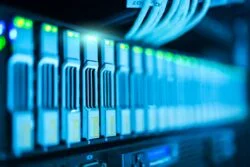Artificial Intelligence (AI) is no longer just a buzzword; it is a transformative force reshaping industries, economies, and the very fabric of the global workforce. By 2025, AI will have a profound impact on the way we work, the types of jobs available, and the skills needed to thrive in the workplace.
In this article, we’ll explore how AI is transforming the workforce, the opportunities it presents, and the challenges that organizations and workers will face as they adapt to this new era of work.
1. The Rise of AI in the Workplace: Automating Routine Tasks
AI technologies are becoming increasingly capable of performing repetitive and mundane tasks that were traditionally handled by humans. From data entry to customer service, many routine tasks are being automated, allowing employees to focus on more complex and creative work.
What’s happening:
- Robotic Process Automation (RPA) is already streamlining administrative tasks across sectors like finance, healthcare, and manufacturing. By automating processes like invoice processing, payroll, and inventory management, organizations can increase productivity and reduce operational costs.
- Chatbots and virtual assistants powered by AI are handling customer inquiries, freeing up human agents to focus on more nuanced or complex issues.
- AI-powered algorithms are analyzing vast amounts of data to automate decision-making processes, such as predicting market trends or identifying operational inefficiencies.
Why it matters: By 2025, AI will dramatically improve workplace efficiency by automating routine tasks, leading to cost savings, faster decision-making, and increased productivity. This will allow workers to shift their focus to more strategic, value-driven tasks that require creativity and problem-solving.
🤖 AI’s automation of repetitive tasks will empower workers to focus on higher-value activities, leading to greater job satisfaction and enhanced creativity.
2. Job Creation in AI-Driven Industries
While there are concerns that AI will lead to job displacement, the reality is that AI will also create new jobs, particularly in areas related to AI development, maintenance, and integration. As AI technologies advance, new roles and industries will emerge, providing opportunities for workers with the right skills.
What’s happening:
- AI developers and engineers will be in high demand as businesses seek to integrate AI into their operations. These professionals will work on everything from developing machine learning algorithms to building and maintaining AI-powered systems.
- Data scientists will play a crucial role in interpreting and leveraging the vast amounts of data generated by AI systems to make informed business decisions.
- AI ethics specialists will be needed to address the ethical implications of AI, ensuring that AI systems are fair, transparent, and free from bias.
Why it matters: AI will create new jobs that require specialized skills, particularly in fields related to AI development, data science, and ethical AI. By 2025, these fields will experience significant growth, offering new career paths for workers willing to upskill.
📈 The growing demand for AI experts will drive the creation of new, high-skill jobs that support the ongoing development of AI technologies.
3. Reskilling and Upskilling: Preparing for the AI-Powered Workforce
As AI continues to change the landscape of work, the need for reskilling and upskilling will become increasingly important. Workers who are able to adapt to new technologies and acquire skills relevant to the future workforce will be better positioned to thrive in an AI-driven economy.
What’s happening:
- Many businesses are already investing in reskilling programs to help their employees adapt to the changes brought about by AI. These programs focus on teaching workers how to work alongside AI technologies, as well as how to develop and implement AI solutions.
- Online learning platforms are offering specialized courses in fields like data science, machine learning, and AI ethics, enabling individuals to gain the skills needed to work in AI-related roles.
- Governments and educational institutions are also launching initiatives to prepare the next generation of workers for the demands of the AI-driven job market, with a focus on STEM (science, technology, engineering, and math) education.
Why it matters: Investing in education and training will be crucial for workers to stay relevant in the rapidly changing job market. By 2025, reskilling and upskilling will be essential strategies for both businesses and employees to stay competitive in an AI-powered world.
🎓 Reskilling programs will help workers adapt to new AI technologies and enhance their skill sets, ensuring they remain valuable contributors in the evolving job market.
4. AI in Recruitment and Talent Management
AI is also making its mark in the recruitment process. By 2025, AI-powered tools will be integral to hiring, talent management, and employee development, making these processes more efficient, data-driven, and unbiased.
What’s happening:
- AI-driven recruitment tools are already helping companies screen resumes, identify top candidates, and match applicants with roles based on skills, experience, and cultural fit. This not only speeds up the hiring process but also reduces human bias.
- AI-powered performance management systems are helping companies track employee performance in real-time, identifying areas for improvement and providing targeted feedback to enhance employee development.
- Employee retention will be supported by AI systems that analyze workforce data to predict turnover and identify strategies to improve employee satisfaction and engagement.
Why it matters: AI’s ability to enhance recruitment, performance management, and employee development will lead to more efficient, fair, and data-driven talent management practices. This will benefit both employers and employees by ensuring the right people are in the right roles and are supported in their career growth.
🧑💼 AI will revolutionize how companies recruit, manage, and retain talent, ensuring better job matches and more personalized career development opportunities.
5. Ethical Considerations and the Future of Work
As AI continues to evolve, ethical considerations surrounding its impact on the workforce will become more pressing. Issues related to job displacement, privacy, and algorithmic bias will need to be addressed to ensure that the transition to an AI-powered workforce is fair and equitable.
What’s happening:
- AI ethics boards and regulatory bodies are being established to oversee the development and deployment of AI technologies, ensuring that AI systems are fair, transparent, and free from bias.
- Universal basic income (UBI) and other policy measures are being discussed as potential solutions to mitigate the economic impact of job displacement caused by AI automation.
- AI transparency and accountability are becoming important issues, with calls for regulations that ensure AI systems are explainable and accountable to the public.
Why it matters: Addressing the ethical implications of AI will be essential to ensure that the benefits of AI are distributed fairly across society. By 2025, AI ethics will be a key area of focus, with governments, organizations, and workers collaborating to create policies that promote fairness, inclusivity, and equity.
⚖️ Ethical considerations will shape the future of AI in the workforce, ensuring that AI benefits society as a whole and addresses concerns related to bias, fairness, and transparency.
Conclusion: The AI-Powered Workforce of 2025
The rise of AI will undoubtedly transform the global workforce by 2025, bringing about both challenges and opportunities. While AI will automate many routine tasks and displace certain jobs, it will also create new roles, increase productivity, and enhance job satisfaction by freeing workers from repetitive tasks.
To thrive in an AI-powered workforce, businesses and workers alike must focus on reskilling and upskilling, embracing lifelong learning to stay competitive in an ever-changing job market. AI will revolutionize industries and job functions, making data-driven decision-making and collaborative work with AI the new norm.
By addressing the ethical implications and ensuring that AI benefits all sectors of society, we can create a workforce that is empowered by technology, innovative, and inclusive.
🤖 By 2025, AI will reshape how we work, creating a more efficient, inclusive, and dynamic global workforce, but only if we embrace change and adapt proactively.
You May Also Like :







